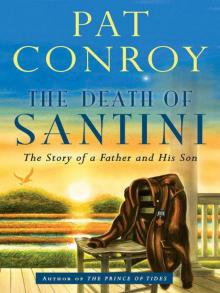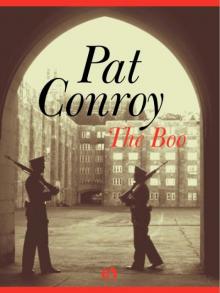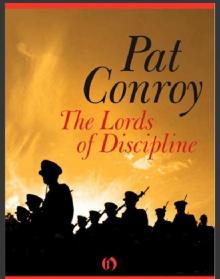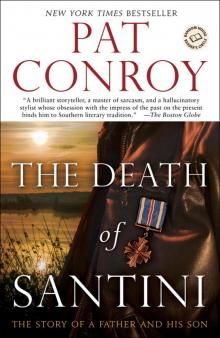- Home
- Pat Conroy
The Boo Page 3
The Boo Read online
Page 3
The cadet who approached in the dull prescribed manner of The Blue Book, asked for a weekend leave only because he heard that other people were getting them, and waxed sour when cross-examined by The Boo, would usually walk out of The Boo’s office prepared to spend another meaningless weekend staring at the bare walls and wooden floors of his barracks room. Unfair? Probably. But The Boo rewarded creativity. In a school where everyone dressed alike, cut their hair alike, walked alike, and supposedly acted alike, it was pleasant to be recompensed for the simple flexing and exercising the mind.
BACKGROUND
Why a book about Courvoisie? What is there about the man that elevates him above every other man on The Citadel’s campus and makes him remarkable enough to be the subject of a book? What about Mark Clark, the imperious war eagle whose face has graced the front pages of most of the world’s newspapers? Or General Harris? Or General Summerall? Someone could make a stimulating book by collecting stories and anecdotes about The Citadel’s more colorful professors. The great Charles Martin, the hulking scion of the history department with his brilliant parables and classic lectures, his astounding prejudices and his love of rhetoric, could merit a book written by a lover of language and flourish. Stories of John Doyle, “Chinchella” Lucas, Oliver Bowman, and Larry Moreland could form an enjoyable collection for Citadel buffs. The Citadel abounds with figures larger than life who pace within the enclosure of the campus, spewing their ideas in fevered, impassioned lectures, and developing their quirks and eccentricities without fear of reprisal. Memorable figures have always lived within the gates. So why Courvoisie? It is because Courvoisie embodies so completely the essential ingredients which guided The Citadel in the sixties. It has to do with spirit and attitude. Whenever there was a cadet activity, no matter how dull or torturous, Courvoisie was there watching over his lambs. It was Courvoisie who visited the cadet in the hospital. It was Courvoisie who offered help when the cadet got into trouble. He was stern, yet fair; he was military, yet colorful; he was duty bound, yet human. It was once said of him that if the cadets ever decided to riot, Courvoisie was the only one on campus who could stop them. That was true. Had the full destructive energies of the Corps ever been released in a full-scale riot, Mark Clark would have been trampled. Courvoisie could have met the charge head on, issued a command, and stopped two thousand men in their tracks. If you doubt this hypothesis, then you did not know the psyche of The Citadel in the era of Courvoisie. And it was a strange era indeed. Events on a national scale changed the focus of America forever. It was a turbulent period for America and a turbulent period for The Citadel, who had to adjust to a new and more critical appraisal of the military and military schools. As a microcosm for the greater troubles afflicting America, The Citadel escaped many of the more tumultuous ones. And even though there were changes and upheavals, The Citadel existed as she always has, far removed from the world outside, a place of order in a world of shifts and change. The Boo added security to The Citadel’s already imposing walls. Every cadet spoke with him. Every cadet laughed with him. He was a focal point of campus life. Mike Arnone, after receiving his diploma, rushed outside the Armory, found The Boo, and asked him to sign his diploma. When The Boo signed it, Arnone stepped back, laughed, and said, “Now, I’ve officially graduated.” No story illustrates so well why this book has been written.
BIOGRAPHY
The Boo was born on October 19, 1916, in Savannah, Georgia, the son of Alfred and Anna Nugent Courvoisie. His father ran a filling station and did bookkeeping on the side. The family led a normal, productive existence until Anna Courvoisie died when her son, Nugent, was only eight years old. The Boo and his father moved in with The Boo’s mother’s people. They remained there until The Boo went off to college.
Two strong influences dominated The Boo’s existence during his early years: the military and the Roman Catholic Church. From his earliest memories, the desire to make the military a career was a strong and compelling force in his life. He attended Benedictine Military Academy, a school in Savannah run by monks which prided itself on its discipline and its religious training. When it was time for him to choose a college, The Citadel was a natural extension of his previous education. Only the monks were missing.
He entered The Citadel in the fall of 1934. He did well in the military environment. His grades teetered on the B or C level and sometimes dipped below the academic horizon. He was never a candidate for a Rhodes Scholarship, but performed adequately in the classroom until an illness felled him his junior year. He flunked out of The Citadel in June of 1937.
In the summer of 1936, The Boo, following the most quixotic instinct of his life, worked his way to Europe on a freighter. He visited many of the major cities of Europe. In Berlin he witnessed the rumblings and first ominous stirrings of the government which turned into the Third Reich. Hitler and his armies were rising to power, the streets echoed the confidence of the resurgent German nation, and the man whose picture was everywhere would eventually bring Courvoisie back to German soil under far less attractive circumstances.
After leaving The Citadel, Courvoisie joined the Georgia National Guard where he stayed for two years. He was commissioned in the Army Reserve in 1940. At this time the eyes of the world were turned toward Germany whose blietzkriegs were changing old concepts of warfare. The eyes of America turned toward England and suffered vicariously during the Battle of Britain. America suffered vicariously until December 7, 1941, when the Japanese Air Force left half our Pacific Fleet at the bottom of Pearl Harbor.
The Boo’s first foreign duty station was Iceland. From there he moved to England in November of 1943. In England he managed to see a pretty Army nurse he had met and liked several years before. Her name was Captain Elizabeth Cosner. They dated as frequently as possible in England. Then she was moved out to the continent. By this time, the D-Day invasion had put the allies on French soil.
Courvoisie hit France in September of 1944. He and his unit surged through France and into Germany. His division was planning to meet up with Montgomery’s forces at the Rhine River. The Germans counter-attacked in a desperate, last-hour attempt to salvage their position. They fought well and hard, twenty miles south of Courvoisie, in what was to become known as the Battle of The Bulge.
In 1945 the war ended. Captain Courvoisie and his pretty nurse, Major Cosner, were married in Liege, Belgium. Major Courvoisie went home at the end of 1945. Captain Courvoisie returned in May of 1946 after having spent forty-five straight months overseas. His daughter Helen awaited his arrival when he landed in the states.
From 1946-50 he was at Fort Sill, the home of the artillery. His son Alfred was born here in 1947. In 1950, he was sent to Georgetown, South Carolina, as an Army instructor for The National Guard. He attended The Citadel with the permission of The Department of the Army. He graduated with the class of 1952.
From 1953-54 he served in Korea. From 1954-56 he was at Fort Benning, Georgia. Then back to Fort Sill. A year at Leavenworth and finally in 1959 he came to The Citadel as Assistant PMS.
His daughter Helen graduated early from the University of South Carolina, entered the Medical University of Charleston and became Doctor Helen Courvoisie in the spring of 1970.
His son Alfred entered The Citadel in 1965, caught hell for being The Boo’s son, received a punishment order from his father, fought a major battle with the quality points, and graduated in August 1969.
Mrs. Courvoisie has been a mother-figure to a generation of cadets. She visits them in the hospital, bakes cookies for them, has them over for coffee, invites them constantly for dinner, and proves the Army adage that the man is only as good as the woman behind him.
BITS AND PIECES
The life of every man is a series of moments, passing interludes, and brief fragments which begin with his birth on the hospital table and end with the final benediction of a grim preacher at the open grave. Most events in one’s life do not merit retelling: the daily habits of bathing and eating, the morning sha
ve, the reading of the afternoon paper. None of these ennoble or enrich the existence of any man, only make that existence both comfortable and possible. But some moments crystallize behind dark corners, unseen and unforseeable, and spring out like flushed quails when least expected. Some memories linger in a man’s mind longer than others, to be savored over, thought about, and remembered as old age approaches. And special people who appear in every life give meaning and variety to existence, by their actions, by the bright effervescence of their smile, or in some cases, by the shadow which darkens and dominates their being. Much of The Boo’s time in the Commandant’s Department was spent tediously studying demerit lists or checking All-in reports, labor which required time and patience. Yet many events happened which stand out and illuminate the ten years he reigned as Assistant Commandant. Most of the stories he recalls are of the villains and blackguards, the bums and cutthroats who covered the body of the Corps like warts, who mastered the subtle art of Blue-Book evasion, and who engaged in dubious battle with the cigar-totin’, silver-leafed Colonel who kept them in the strangling confines of his pasture. These are the stories of cadets remembered being cadets and being people.
The Boo, as Tac Officer for Band Company, welcomed his boys back from Christmas furlough in January 1965. He bantered with several cadets about their sexual exploits over the holiday. Walking up to Ted Malcolm, the Company Commander, he said, jokingly, but with mock gravity, “Bubba, I heard you got married over the holidays.” “Sir,” Malcolm answered strangely. “Did you get married or not?” “Sir.” It suddenly dawned upon The Boo that he had better shut his mouth as quickly as possible and get the hell away from poor, trembling Malcolm. Malcolm introduced him to Mrs. Malcolm and little Kelly at graduation.
Cadets sometimes thought The Boo was under the same regimen and bound to the same rules they were. One zealous cadet accosted him at a basketball game and gave him a minor bawling out for attending a Citadel function in civilian clothes.
This announcement caught Boo’s ear as he walked through the mess hall one night: “All friends of Freddie Hack will have a meeting in the telephone booth outside the mess hall at 1900 hours.”
A. F. Calhoun was a crack rifle shot for The Citadel. During his last year at the college it came out in the Charleston newspaper that he was married. Details about the ceremony were included. He ranted and raved because he had paid a desk clerk at the paper extra money to insure it would not be put in the paper.
Suggs Britton, in the school of the big-time operators— a card player who flirted with punishment orders during his entire career, a genuine bum, a cadet who earned a Boo-inspired sobriquet of fourteen carat reprobate—wrote The Boo to tell him about the first job he got upon graduation. He was commandant at a military high school in Florida.
During one of the last parades of the year, when the adjutant was reading a list of tactical officers who would not be returning to The Citadel the following year, The Boo walked through second battalion checking for cadets who skipped parade. As he walked up the third division, he heard the adjutant’s voice booming through the loudspeakers across the length and breadth of the campus. “Colonel Smith is leaving. Major Samuel is leaving. Captain Adams is leaving,” when a loud and vigorous “Bull—” rang out from a room not thirty feet away from him. Poor Cadet Cludd smiled weakly and accepted the timing of the fates when The Boo peeked in the door and asked gently, “Pardon me, Bubba, but what’s your I.D. number?”
Young George Durk played the military game well and kept his name free from the debris of excess demerits. He walked no tours and served few confinements, so it was no surprise he died many times when he was driving back to The Citadel wearing civilian clothes and noticed Colonel Courvoisie’s green Comet in his rear view mirror. He slumped as low into his seat as humanly possible, peering through the steering wheel, and suffering unspeakable agony as the Comet continued to follow him. The Boo did not see him, but Durk later told him that the moment was the nearest thing to coronary failure he experienced while at The Citadel. Durk became a doctor and practiced in Charleston. The Boo was his patient years later at the Veterans Hospital. In an act of immaculate revenge or pleasant duty, Durk administered three doses of purgative medicine and three enemas to the stricken Colonel. The Boo always thought the smiling doctor was getting him back.
The Boo broke into a full-fledged oyster roast being conducted professionally by Frank Carter Herst. Herst used garbage can tops to heat them up and was chewing on a succulent oyster when The Boo dropped by to say, “Hello.”
Romanticism lived in the gilded, nineteenth century heart of Neal Brady, Commander of Company “G.” His girl friend, a dripping, drawling, honey-voiced young maiden from Charlestori, merited some special celebration or act of adoration when he pinned her at the moss-darkened corner of White Point Gardens. So Brady hid all the freshmen of his company around the garden. As the gallant, young Brady pinned his blushing sweetheart, the chorus of silver-throated knobs broke into a chorus of “I Love You Truly.” Ah, yes! Old Neal, the last of a dying breed.
In 1959 F. P. Canowski’s picture graced The Citadel yearbook for the first time. Seven years later it was pictured in the yearbook for the last time. When F. P. finally graduated, an era in Citadel academics, a saga that may well never be repeated and a record that may never be equalled, was over.
Life was a serious affair for A. Coplis. The boy smiled infrequently, frowned often, and discarded humor as a relevant part of his life. He walked into Boo’s office with his trunk one day. To go along with his dark-cloud view of the world, some cadet who did not take life seriously as hell, crapped in poor Coplis’ trunk. Coplis demanded The Boo do something. Boo did. He emptied it.
Caldwell Brown did not freely embrace the vow of poverty. While other cadets suffered in the humidity and heat of summer-school in Charleston, Caldwell, in the spirit of rugged individualism, walked out to his air-conditioned car and slept in supreme comfort.
Though mammas might deny it with vehemence, the cadet away from campus and free from the bondage of The Citadel’s iron gates is one part alcoholic and one part animal. Whether a weekend leave or an organized exodus in support of the football team, the gentlemanly qualities of cadet training die a rapid death whenever cadets pass through the portals of The Citadel. In 1961 The Citadel football team won the Southern Conference Championship and received a subsequent invitation to play in the Tangerine Bowl in Orlando, Florida. On the memorable day itself, as the teams lined up for the kickoff, and the cadet cheering section roared encouragement, and the Summerall Guards stood rigidly presenting arms, The Boo saw one of the guardsmen weaving precariously back and forth, back and forth. The debauchery of the night before had proven too much for Cadet Slocum, and even the glint of the sun off his silver bayonet blade and pride inherent in belonging to the Guards could not stem the wave of nausea or impending unconsciousness from crossing over him. Boo inched up behind him and whispered in his sweet, death-like voice, “Mr. Slocum, if you have any hope of living to see tomorrow’s sunrise—any hope at all, Mr. Slocum—then you will straighten up and pretend to be a model cadet of the school you represent. And Slocum, I’ll be watching you.” Almost instantly Slocum became as rigid as a cigar store Indian. The weaving ceased and was quickly replaced by something akin to nervous perspiration. Mr. Slocum is now an Army major with a silver star to his credit.
Sam Montgomery, witty and corpulent porkchop from “R” Company, threw his laundry bag off the second division and to the surprise of all observers, went right along with it. Sam was a little shaken, but escaped serious injury.
Mac Coreland used to jump off the second division into the Company pile of laundry bags just for kicks. Mac seemed a little bored with life and this seemed like the most logical way to put spice and variety into an otherwise dull existence.
Tommy Farris came to The Boo’s office with tears streaming down his face. He discovered that a good friend of his was stealing from other cadets’ rooms. He turned in th
e boy’s name to Colonel Courvoisie, saluted, and walked out of the office, still sobbing.
Three senior privates of slovenly vintage took exquisite pride in their wool pants which, according to legend, had been passed down from a sloppy senior to sloppy junior in an unbroken line for 12 years. These pants covered the limbs of Clammy Sadler, Seymour Farrell, and C. T. Curds, all of whom claimed the pants had never been pressed or cleaned. The legend goes on to claim that somewhere in the nether regions of The Citadel these same pants wander the galleries at night in search of some phantom senior privates who might, with unabashed pride, wear them again.
One senior, an acknowledged slob, Zak Sklar, had 95 demerits at Christmas time, which was a hell of a lot of demerits to have, even for an acknowledged slob. The Boo warned him that the gods of discipline would show him the way to the front gates if he passed the yearly quota. Boo advised Sklar to resign. This would mean Sklar could return to The Citadel the following September. If a cadet is booted for excess demerits, his arse never darkens a sallyport again. Sklar decided to stick it out, became conscious of the shined shoe and the glittering brass, counted demerits like a fat man counts calories, and graduated with his class in June.

 A Lowcountry Heart: Reflections on a Writing Life
A Lowcountry Heart: Reflections on a Writing Life The Death of Santini: The Story of a Father and His Son
The Death of Santini: The Story of a Father and His Son The Boo
The Boo The Prince of Tides
The Prince of Tides Beach Music
Beach Music The Water Is Wide
The Water Is Wide My Losing Season
My Losing Season The Lords of Discipline
The Lords of Discipline Pat Conroy Cookbook
Pat Conroy Cookbook My Reading Life
My Reading Life My Exaggerated Life
My Exaggerated Life The Pat Conroy Cookbook
The Pat Conroy Cookbook A Lowcountry Heart
A Lowcountry Heart The Death of Santini
The Death of Santini